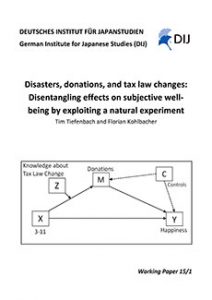
Download
Details
2015, Deutsches Institut für Japanstudien, Tokyo, 39 p.Authors
Kohlbacher, Florian
Disasters, donations, and tax law changes: Disentangling effects on subjective well- being by exploiting a natural experiment

This paper sets out to investigate (i) whether an increase in donations in the aftermath of disasters can mitigate the negative effects on subjective well-being (SWB), and if so, (ii) whether policy measures such as tax law changes can amplify this mitigating effect by providing further incentives for donations. To analyse these questions we use data on a recent, impactful disaster: the triple disaster that occurred on March 11, 2011 in Japan (3-11). Coincidentally, only three month after the disaster, a long planned change in tax law was put into effect which allows higher tax deductions for charitable donations. Applying a moderated mediation analysis to a unique dataset, we are able to disentangle the total rise of donations into positive effects that are caused by the disaster itself, and positive effects that are caused by the recent change in the Japanese tax law. The results of our study are twofold: First, we show that about 40% of the direct negative effect of 3-11 on SWB is mediated and mitigated by donations. Second, we show that the change in taxation law could have further mitigated the negative SWB effects of 3-11, if more people had been aware of it. However, since a large majority of the Japanese public had not even been aware of the tax law change, potential mitigating effects by increased donations have not been realized. As for policy implications, our results show that governments can create incentives for donations that not only support disaster reconstruction, but also mitigate the negative SWB effects of disasters.
Keywords: Natural Disasters; Charitable Behaviour; Life Satisfaction; Happiness; Taxation
JEL: Q54, I31, H84, D64
PsycINFO: 2260, 2360, 2900